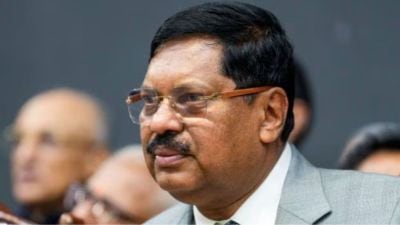Warmth in the Kashmir snow: justice on fast track for quake victims
Daulet Bee stands silently as a judge pores over her application.The 65-year-old widow had been dropped from the list of October 8 earthquak...

Daulet Bee stands silently as a judge pores over her application.
The 65-year-old widow had been dropped from the list of October 8 earthquake victims and this mobile court represents her last hope.
After a few queries by local revenue officials, pat comes the announcement: “Your house is indeed damaged so we award you Rs 30,000.”
This is Lok Adalat for Gharkoot — a remote village overlooking Pakistan-occupied Kashmir — which was devastated in the October quake. The court is one of many set up by Jammu and Kashmir High Court to help quake survivors in the Valley’s remote hilly areas—a brainchild of Justice B A Khan, acting Chief Justice.
The Gharkoot court is the 10th court that Additional District Judge, Sheikh Ghulam Nabi, has presided over. Nabi has settled over 200 cases and helped disburse more than Rs 2 crore in relief.
About 50 Lok Adalats have held court in the past 15 days across the state, deciding around 5,000 cases and disbursing Rs 12 crore. The disbursal could otherwise have been held up as a result of family disputes or errors in government survey reports.
The Lok Adalats have covered inaccessible villages like Kamakote, Urusa and Gharkoot across an extensive swathe along the Line of Control in Tanghdar, Uri and Poonch. “(The) success rate is 100 per cent,” says Hasnain Masoodi, registrar-general of the HC. “The justice is conciliatory rather than adjudicatory and thus fast,” he added.
The courts came in for praise from President A P J Abdul Kalam when he visited the quake-hit areas on November 26 and 27. Kalam handed out cheques to the victims and said the good work of the courts should be emulated across India. The Adalats operate in a simple manner: quake victims submit a simple unstamped complaint to the court. The judge goes through it and seeks verifying documents from revenue officials.
If he is still not satisfied, he calls the village numberdar, chowkidar and two independent witnesses. If they also testify in the complainant’s favour, a favourable judgement is issued quickly.
The judges are accompanied by engineers who decide on the spot if it is possible to continue living in the building. Insurance cases are also dealt with. “We take the senior officials from insurance companies who are persuaded to settle cases immediately and waive documents in genuine cases,” registrar-general Masoodi says.
Three Lok Adalats are simultaneously holding court at a government rest house 2 km from Gharkoot. People mill about anxiously with their complaints asking advocates who have volunteered for the courts to write out their applications. Messages are flashed intermittently over the public address system announcing the names of those whose cases have been taken up. “We saw cases where the deserving had been neglected in favour of the politically connected. Scrutinisation by Lok Adalats has checked this tendency…relief distribution has been straightened out,” says Mohiuddin Wani, president of the Baramulla Bar.
Photos


- 01
- 02
- 03
- 04
- 05




























